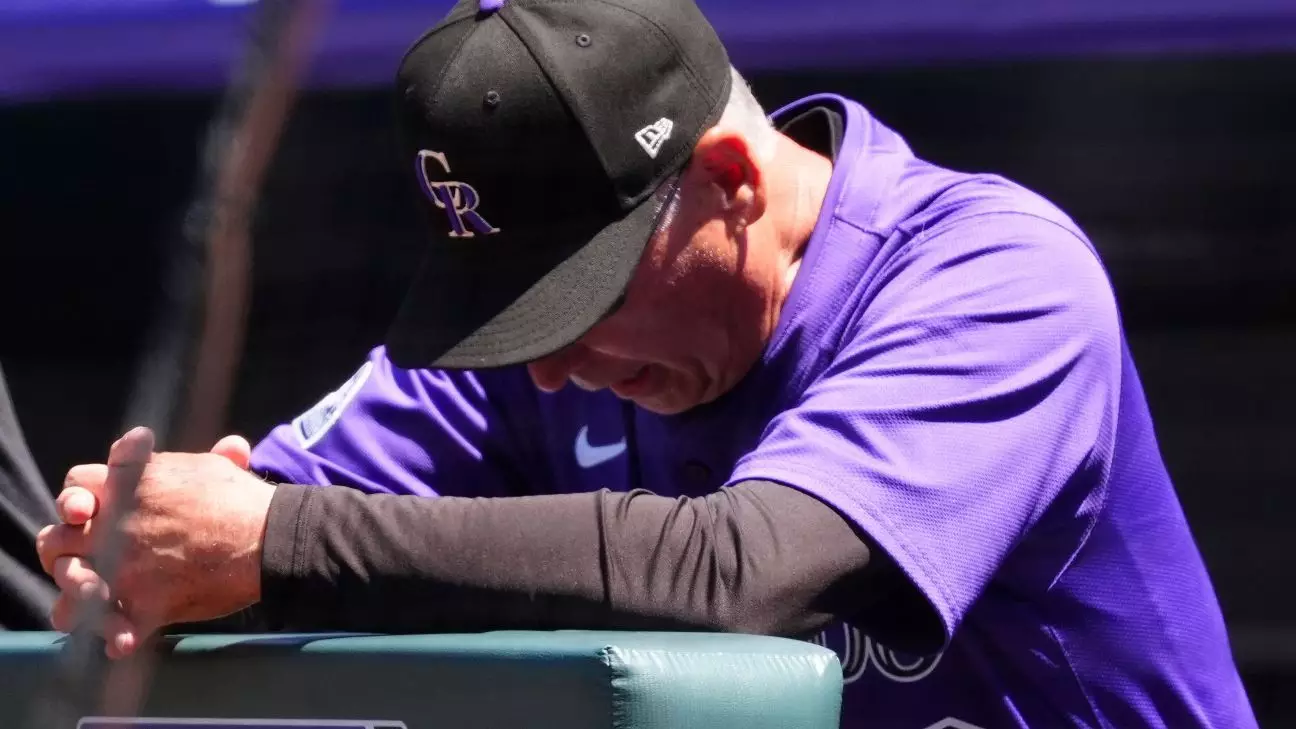In a dramatic turn of events, the Colorado Rockies have severed ties with manager Bud Black following an abysmal game—a staggering 21-run loss to the San Diego Padres. This shocking dismissal has sent ripples through the sports community, amplifying discussions about managerial accountability in Major League Baseball. Black, who has worn the Rockies’ manager cap for nearly a decade, leaves behind a legacy marked by highs and lows, but ultimately defined by recent struggles and underperformance. With a dismal 7-33 start to the season, the team’s initiatives to instigate change feel urgent, albeit somewhat reactive.
The Rockies’ brief reprieve came in the form of a 9-3 win on Sunday, allowing them to break an eight-game losing streak but hardly masking the severity of their situation. The record now stands as the worst 40-game start in franchise history and evokes comparisons to the infamous 1988 Baltimore Orioles. As fans and analysts alike ponder the implications of this decision, it seems all too clear that something had to give.
A Cycle of Disappointment: The Rockies’ Underwhelming Trajectory
The decision to part ways with Black has been long debated, especially considering his previous achievements, including back-to-back playoff appearances in 2017 and 2018. However, the consistent underachievement that followed those seasons has been nothing short of alarming. The Rockies have failed to finish with a winning record since those playoff runs, enduring two consecutive 100-loss seasons. After such a consequential decline, it’s hard to deny the urgency felt by the team’s executives.
Owner Dick Monfort’s statement reveals an acute awareness of the fans’ frustrations: “Our play so far this season…has been unacceptable.” Therein lies the paradox of professional sports—fans demand immediate results, yet systemic failures often stem from deeper issues that transcend coaching. While Black’s departure can be attributed to poor on-field performance, it begs the question of whether a single managerial change is enough to overturn the culture of mediocrity that has reportedly entrenched itself within the Rockies’ organization.
New Faces, Same Mountains to Climb
In the wake of Black’s exit, the Rockies have appointed third-base coach Warren Schaeffer as interim manager, while hitting coach Clint Hurdle takes on the mantle of interim bench coach. While this change brings immediate fresh perspectives, it also poses a unique challenge. Without a clear vision that extends beyond individual game outcomes, hand-picking interim coaches may only serve as a temporary band-aid rather than the holistic solution the franchise desperately needs.
General Manager Bill Schmidt’s comments about the team’s “growth” and commitment to improvement are commendable but lack the actionable specificity fans crave. Talk of “turning it around” can often sound disingenuous when the team has been outscored by 128 runs in just 40 games. One can argue that perhaps, instead of incremental changes, a radical rethink of the Rockies’ operational priorities is essential for sowing long-term success.
Reassessing Organizational Dynamics: Culture and Commitment
For a franchise with aspirations beyond just a few wins, assessing the organizational culture is critical. A continuation of the current path will only widen the gap between the expectations and reality faced by the Rockies. The constant cycle of dismissals, rehires, and interim coaches suggests a need for introspection regarding player development, scouting, and the overall strategic direction of the franchise.
As the Rockies prepare for a road trip against the Texas Rangers, they must foster a renewed sense of commitment throughout the organization that transcends simplistic game-day victories. There needs to be an overarching philosophy that promotes accountability at all levels, not just at the managerial tier. This involves coaching staff, players, and even ownership being aligned and working cohesively toward mutual goals.
The Stakes Are High: A Fanbase at a Crossroads
Ultimately, the challenge for the Rockies is not simply to fill a managerial void but to cultivate an environment that thrives on resilience and adaptation. This pivotal moment can either serve as a catalyst for growth or spiral into deeper disappointment for both the team and its supportive fanbase. Significant adjustments will need to be made at multiple levels, and the stakes couldn’t be higher.
As conversations shift to what the next chapter of Rockies baseball will entail, the organization’s leadership must take decisive actions that reflect the values and aspirations of its dedicated supporters. The road ahead is treacherous, but it’s a journey that could redefine the Rockies if they can meet the considerable challenges head-on.

